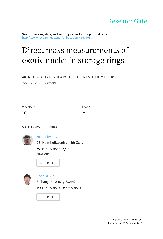摘要
Mass measurements of exotic nuclei is a fast, developing field which is essential for basic nuclear physics and a wide range of applications. The method of storage ring mass spectrometry has many advantages: (1) a large amount of nuclides can be simultaneously measured; (2) very short-lived (T(1/2) greater than or similar to 50 mu s) and very rare species (yields down to single ions) can be accessed; (3) nuclides in several atomic charge states can be investigated, (4) half-life measurements can be performed with time-resolved mass spectrometry. In this contribution we concentrate on some recent achievements and future perspectives of the storage ring mass spectrometry.
- 出版日期2010-2
- 单位中国科学院近代物理研究所; 北京航空航天大学
